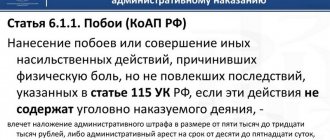Article 116 of the Criminal Code of the Russian Federation “Beatings” is one of the “softest” articles in the entire Criminal Code of the Russian Federation. Our criminal lawyers know ways to legally avoid punishment and, more importantly, a criminal record. A criminal record is the most unpleasant thing you can get if a case of battery is opened against you.
It is important to know: the investigator will be happy to initiate a criminal case under Article 116 of the Criminal Code of the Russian Federation “Battery”, if it is known who committed it. A solved criminal case is a plus for the investigator. Your goal is different - you need to avoid a conviction and a criminal record. Without the help of an experienced lawyer, you will be left alone with an unfriendly investigation and court system.
For which beatings is only administrative liability charged under Article 6.1.1 of the Code of Administrative Offenses of the Russian Federation?
Administrative liability applies where, according to new legislative standards, the actions of Articles 116 and 115 of the Criminal Code of the Russian Federation do not apply.
That is, these are beatings that exclude a criminal offense. Here, the norms of criminal law are replaced by administrative penalties (“administrative penalties”), focusing on the provisions of Article 6.1.1 of the Code of Administrative Offenses of the Russian Federation.
In legal interpretation, the offense excluded from the list of criminal offenses is defined as simple battery.
In order for it to qualify in the designated context, conditions are required that mitigate the liability of the attacker:
- the injured person should not be one of the relatives or other close persons, which means citizens who have entered into a relationship, the so-called civil marriage or cohabitation.
- The victim who was beaten should not be a known minor, pregnant or elderly or disabled.
- The crime is committed by the attacker for the first time and is not a repeat offense.
- Characteristics of qualifications in the form of hooligan motives, religious and political hostility, etc. are excluded from illegal actions.
- The victim did not suffer significant damage to his health.
At the same time, the actions of the guilty person are obviously deliberate, that is, the blows were inflicted on them intentionally and purposefully. When determining the characteristics of the offense, it is taken into account that more than two blows were struck, with short time intervals.
IMPORTANT: In addition to direct blows, other types of infliction of pain are taken into account in the form of twisting of arms, kicks, hair pulling, etc.
Article 86 of the Criminal Code of the Russian Federation
• in relation to persons sentenced to imprisonment for crimes of minor or medium gravity - after three years after serving the sentence;
- in a number of cases, a criminal record is provided by the legislator as an element of the main element of the crime (Article 314 of the Criminal Code);
Expungement of a criminal record means the termination of its legal consequences before the expiration of the terms established by the Criminal Code for the expungement of a criminal record. If the convicted person behaved impeccably after serving his sentence, then, at his request, the court may early remove his criminal record. a) in relation to persons conditionally sentenced - after the expiration of the probationary period; An exception is made only for those sentenced to probation: the criminal record of these convicted persons is expunged after the expiration of the probationary period (clause “a”, part 3 of article 86 of the Criminal Code), if there was no conditional conviction canceled on the grounds provided for in Art. 74 of the Criminal Code.
Who has the power to award degrees of punishment and set deadlines?
The penalty is carried out on the basis of a decision made by the district administration at the place of registration and residence of the guilty person. This decision is made by a commission; the commission includes authorized officials, the list of whom is approved by the head of the local municipality.
Consideration of the issue of recovery from the offender takes place at a scheduled meeting of the administrative commission.
The secretary of the meeting reads out the materials presented for the hearing about the offense committed.
The members of the commission are faced with the task of determining the legality of imposing a penalty on the basis of the facts established by the presented evidence base.
Material regarding the offense may be submitted to the authorized commission from:
- the victim of beatings;
- police department;
- district court.
In the first case, the victim collects evidence of the offense on his own; in the second case, the police collect the material and transfer it to the administrative commission, provided that the precedent does not meet the criteria of criminal law.
The court can also transfer a statement to the administrative commission if it does not reflect the rules that exist for criminal prosecution.
The review period after submitting an application to the administration and its acceptance for consideration by the commission can be up to 30 - 45 calendar days, depending on the date on which the next meeting is scheduled. As a rule, commission meetings are scheduled once a month to one and a half.
Administrative liability, like criminal liability, depends on the severity of the consequences for the victim of the crime.
The fine collected from the perpetrator may decrease or increase based on the following factors:
- number and force of blows delivered;
- motives for the offense;
- extenuating circumstances;
- physical damage to the victim’s health.
The maximum fine for administrative penalties is 40 thousand rubles.
If the consequences of the beating can qualify the injuries as mild, then criminal liability arises in accordance with the provisions of Article 115 of the Criminal Code of the Russian Federation.
In case of more serious consequences for the patient’s health, administrative liability also does not arise - the offender is charged with punishment according to the norms of the criminal article.
What liability is provided for assault under the Criminal Code of the Russian Federation? And other nuances that will help you better understand the provided punishments:
- Classification of beatings.
- What is mild battery and what is the liability for it?
- What is moderate battery and responsibility for it.
- And the most severe punishment will be for causing grievous bodily harm.
Also, in what case will the liability be administrative (according to the Code of Administrative Offenses of the Russian Federation) and when will only a fine be imposed as a punishment?
The deadlines for the execution of an administrative penalty are indicated in the administrative act, with an extract from the commission’s decision. As a rule, when collecting a fine, they are three months. Compulsory administrative work may be imposed after one month.
Re-prosecution for beating
If the perpetrator was previously brought to administrative responsibility for beatings, then a repeated appeal to the executive committee to impose punishment for assault in the form of a fine or administrative work can only follow after three years.
During this period, the consequences in the form of administrative punishment are extinguished, after which beatings without qualification can again be considered as an administrative offense. Such rules apply only to intentionally inflicted beatings.
Other types of administrative offenses can only be taken into account at the discretion of the administrative commission.
When re-penalizing for a fight after 3 years, it is still taken into account that the administrative punishment has already been imposed.
The violator is subject to the maximum permissible fine or other penalty. The slightest degree of qualification becomes a precedent for transferring the case to court.
If less than three years have passed since the penalty was issued, then the case materials are considered by the court. During this period, until the expiration of the statute of limitations, the previous decision on administrative liability retains legal force.
This requires recognition of the fact of relapse, and the use of more stringent forms of suppression of the offense, that is, criminal liability under the provisions of Article 116 of the Criminal Code of the Russian Federation. Repeated liability within three years after the issuance of an administrative penalty for a fight can only be criminal.
ATTENTION: Administrative and criminal liability for beatings is imposed on offenders from the age of 16, if the harm caused to health reaches moderate severity and above - from the age of 14.
Terms and procedure for expunging a criminal record
Art. 86 of the Criminal Code is called “Criminal Record” and contains some aspects:
Art. 85 of the Criminal Code of the Russian Federation provides for the possibility of pardon .
There are a number of differences between amnesty and pardon:
Early expungement of a criminal record is regulated by the provisions of Art. 86 Criminal Code + art. 400 Code of Criminal Procedure + a number of other acts: It is assumed that you can provide the court with the following materials as evidence : The probationary period can last from 6 months. up to 5 years .
During this time, the culprit will have to prove his correction (be cured of sexually transmitted diseases, refrain from visiting certain places, find a job, “be registered and notify of a change in place of study).
How to get a case filed against an offender: step-by-step instructions
In order to have significantly greater guarantees for bringing to justice, it is necessary to call a police patrol already at the time when it becomes obvious to the victim of the attack that the attack cannot be avoided. If this fails, you can shout for help and ask passers-by to call the police. The arriving police will prevent a fight and draw up a report on the fact of beating.
Subsequently, based on the drawn up protocol, the local police officer and the investigator will collect the case materials. They will also give a referral for a forensic medical examination to examine the presence of injuries and small traces of evidence of a fight.
For administrative liability, there are sufficient materials establishing the fact of striking. Punishment follows the infliction of pain and humiliation of the individual, and not for the consequences that occur.
If the police did not arrive at the scene of the incident or the call to the patrol on duty did not take place for objective reasons, you need to go to the police station yourself. You must contact the police station at the scene of the incident.
Here you will need to write a statement (sample), which should indicate:
- time and place of the fight.
- The reasons and other accompanying circumstances on the basis of which the victim was struck.
- If the identity of the offender and his residential address are known, then be sure to provide this information. If unknown, indicate that the beating was carried out by an unknown person.
- Consequences in the form of injuries and other visible disorders of the skin, which will subsequently need to be examined.
- If a fight was observed or stopped by familiar and unfamiliar passers-by, indicate their data to confirm the precedent.
The actions taken will also allow the resource of law enforcement agencies to be involved in the proceedings, which will transfer the collected materials to the administrative commission.
Sometimes the police refuse to accept a statement for one reason or another. This is not a reason to leave the offense unpunished. The victim of beating has the right to submit documentation independently.
To do this, you will need to collect evidence of the incident that resulted in the beating yourself. Evidence may include:
- testimony of witnesses to the fight;
- medical examination report;
- photo and video materials;
- recording from surveillance cameras;
- other evidence.
Taking an examination without a referral is included in the range of paid services. Subsequently, the costs incurred can be recovered through a civil claim in court.
With the evidence obtained, you need to go to the building of the executive committee of the district where the culprit lives. Contact the reception desk and write an application to accept a case of an administrative offense.
The statement briefly describes the fight; at the end of the text, a list of documents that are offered as evidence is attached. Photocopies of the received documentation are also attached.
The submitted application is considered according to the regulations within no more than 5 working days. If it is accepted, then a day for the commission’s meeting is set.
On this day, you are required to come with the original materials - evidence of the offense and witnesses to the ongoing fight. You will need to speak before the commission and present the situation as objectively as possible, based on evidence.
If the commission rejects the consideration of the issue, then it is necessary to receive a reasoned refusal in the form of an extract, indicating the reasons for the refusal to consider the offense.
With this extract, within 10 calendar days after receiving it, you can go to court.









